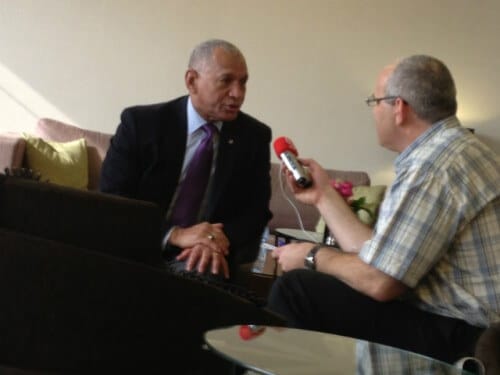The head of NASA, Charles Bolden, in a special interview with Network B: The next disaster in space is inevitable

Despite the reductions imposed by the Obama administration on the American space agency, the head of the agency, Charles Bolden, is convinced that it will meet its goals: to land humans on an asteroid by 2025, and on Mars - during the 30s. Bolden hopes that other countries will take on the first part of the challenge - to return and land humans on the moon, so that the Americans can focus on the goals he has set. "We hope that some of our partners will take responsibility for flying humans to the moon. We will of course help, maybe participate, but we are focused on the goals of landing humans on an asteroid in 2025 and a human on Mars in the 30s. I am convinced that it will happen," he said in the special interview with the B network.
Unacceptable budgeting
In recent weeks there have been several reports of a sharp disagreement between Bolden and President Obama over the question of funding for the manned flight to Mars. "There is no dispute with the administration, because I am part of the administration. We are working with the president in developing the budget. In contrast, in Congress, there may be a dispute, and not the entire budget we request - they approve us", he says. "The budget we help the president prepare reaches Congress, and they tell us it is yes, and it is no. This is democracy in the US."
About a year and a half ago, the US shut down the space shuttles, and since then it has been dependent on other parties for flying supplies to the station, and on one party - Russia - for flying crew members. In recent months, a private company SpaceEx started operating supply flights to the station after winning a NASA tender, and more companies are expected to join in the coming years. Now the company is working on training the "Dragon" spacecraft to fly astronauts. We definitely have a disagreement with Congress on the scope of funding for this program, says Bolden. "The controversial issue now is how much we are willing to spend on commercial flights of humans into space. The President and I agree that Congress is not allocating the necessary funding for this. We asked for a billion dollars a year, Congress gave us zero in the first year, unacceptable to me. Next year we received 424 million - that's a lot of money, but not close to the amounts needed for the manned flight program that will start operating in 2017. We need to be able to fly humans into space, and right now we don't have that ability."
an inevitable disaster
Bolden came to Israel to participate in the Ilan Ramon Space Conference, organized by the Israel Space Agency at the Ministry of Science and the Fisher Institute. This year, the focus of the convention is the tenth anniversary of the Columbia ferry disaster. "I'm not prying into what could have been," says Bolden when asked if the disaster could have been prevented. "It was an unfortunate accident. I believe that with enough diligence and thoroughness, most accidents can be prevented, but it is inevitable that bad things will happen. Now, with our entry into private spaceflight, one of the things I warn them is to prepare for the loss of spacecraft and crew. It's not a question of if it will happen, but when it will happen. It's inevitable in ten, twenty, thirty years, and when something like this happens, it's a big trauma."
Collaborations in Israel
To the question if he sees a chance of launching another Israeli astronaut, Bolden replies, "There is a chance that we will do it. We are at the beginning of the planning of the distant missions, in which humans will be launched beyond the orbit around the Earth, and even beyond the moon. As we move forward with these plans, all our international partners will cooperate with us. And there is a fairly good chance that there will be another Israeli astronaut. Flights to the International Station are usually made by agreement between the partner countries of the station, but the Israeli Space Agency is not a member of the station."
On Columbia's last flight, Ilan Ramon and his friends performed several Israeli scientific experiments. Since the disaster, more Israeli experiments have been launched into space in the other shuttles, a collaboration that of course ceased with the landing of the shuttles. Bolden tells us that NASA is looking for ways to expand research cooperation with Israel. "One of the reasons I am here, apart from marking Ilan Ramon's legacy, is the continuation of cooperation with our partners at the Israeli Space Agency, according to the framework agreement signed about two years ago. Most of us want to work in the fields of earth sciences, especially in the field of dealing with climate change. I assume that this is what our work with the Israeli Space Agency will focus on."
As part of the Space Week events, Bolden also has several meetings planned with students - an area he is very careful to nurture and develop. After four space shuttle flights, I - he says - will probably never return to space. But it is important to bring the generation of young people closer to the field, because they are the ones who will eventually reach Mars.

One response
Being stuck in a spaceship is a kind of prison